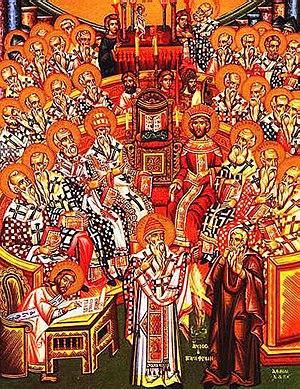
(image in public domain)
By Spencer D. Gear
Was Jesus’ death for the sins of all people or for only the elect – those who become Christians? Or, to put it in parallel language, was Jesus’ death for the whole world or only for some of them? You wouldn’t believe how these types of questions can get the theological juices going!
Titus 2:11 reads, ‘For the grace of God has appeared, bringing salvation for all people’ (ESV). What is a plain reading of the text saying? When did God’s grace appear? What was it? How did it bring salvation to all people? Are all going to be saved? Is this a verse that promotes universalism (salvation for everyone)? Please read on.
When I raised this online, a Calvinist stated,
The Greek word behind ‘appeared’ is … epiphainw. Strong’s Concordance says the word literally means “to show forth, i.e., to appear” or “to shine upon” or “become visible”.[1]
This person didn’t know any more Greek than Strong’s Concordance (I have a BA in biblical literature & NT Greek and PhD in NT). I could not say this better than Gordon Fee, emeritus professor of New Testament at Regent College, Vancouver B C, Canada and editor of Eerdmans’ New International Commentary series on the New Testament. Fee, a extremely competent Greek exegete, wrote of Titus 2:11,
An explanatory for opens the paragraph and thus closely ties verses 11-14 to 2-10. It proceeds to explain why God’s people should live as exhorted in 2-10 (so that the message from God will not be maligned [v. 5] but instead will be attractive [v. 10]): because the grace of God that brings salvation to all people has appeared.
In the Greek text all of verses 11-14 form a single sentence, of which the grace of God stands as the grammatical subject. But contrary to the NIV (and KJV), Paul does not say that this grace appeared to all men; rather, as almost all other translations have it, and as both Paul’s word order and the usage in 1 Timothy 2:3-6 demand it, what has appeared (see disc. on 1 Tim. 6:14; epiphaneia) is grace from God that offers salvation to all people.
Paul does not indicate here the reference point for this revelation of God’s grace. Most likely he is thinking of the historical revelation effected in the saving event of Christ (v. 14; cf. 2 Tim. 1:9-10), but it could also refer existentially to the time in Crete when Paul and Titus preached the gospel and Cretans understood and accepted the message (cf. 1:3 and 3:3-4). That at least is when the educative dimension of grace, emphasized in verse 12, took place (Fee 1988:194, emphasis in original).
The Calvinist again:
So according to Titus 3:4, what happened when God “appeared”? Look at the next words… he saved us. How? By the washing of regeneration. We are saved by God’s grace appearing that washes us in regeneration. Why don’t you translate the verb as “offer” here?
So in Titus 2:11, same verb used….
So grace “appears” again and what does it do? The same exact thing it does in Titus 3:4! It “brings salvation for all people” just like the grace in Titus 3:4 “saved us”. The grace that appears in Titus 2:11 also trains us to renounce ungodliness and worldly passions, and to live self-controlled, upright, and godly lives. Nothing about an “offer” anywhere in the text. The word … can’t even mean “offer”. None of the definitions of the word even suggest such a thing. So either “all people” doesn’t mean 100% of humanity, or Universalism is true.[2]
My response [3] was that Titus 3:4 is in a single Greek sentence in the original that includes Titus 3:4-7.
The sentence in Titus 3:4 begins with ‘but when’ – a when-clause. The preceding verse (3:3) speaks the language that ‘we ourselves were once’. But then there came a time when God’s mercy took effect in their lives. We know from Titus 2:11 that God’s grace ‘appeared bringing salvation’, which was ‘the doctrine of God our Savior’ (2:10). We know that this happened historically in Christ’s person and work and especially in his atoning sacrifice.
Back in Titus 2:11-14, the emphasis is as in Titus 3:5-7, that God’s mercy brought salvation through regeneration, renewal of the Holy Spirit, justification and their becoming heirs of hope. This was the readers’ own experience of salvation.
As for the verb, ‘appeared’, this word also is used in 1 Tim 6:14-15, ‘until the appearing of our Lord Jesus Christ, which he will display at the proper time’. Here ‘appear’ refers to the Parousia, the second coming of Christ. Do you want to import that meaning of ‘appear’ into Titus 2:11 and Titus 3:4?
The same word, ‘appear’, occurs in Acts 27:20, ‘When neither sun nor stars appeared for many days, and no small tempest lay on us…’ (ESV). Do you want this meaning of ‘appear’ to be given to Titus 2:11 and 3:4?
It is not unusual for a Greek word to be used in different contexts to mean different things. However, from Titus 2:11; 3:4, we know that that context is talking about salvation through Christ in which the grace of God appeared to all people and have a guess what? This grace of God offers salvation to all men (people) [Titus 2:11].
So what appeared in this epephane, which refers to something becoming visible or making an appearance? All human beings could not have reached a satisfactory understanding of God’s grace without the manifestation of Jesus Christ through his incarnation and atonement. Titus 2:11 shows the effects of this grace, ‘bringing salvation for all people’ (ESV). Thus the universality of the salvation offer is made available thanks to Christ’s epiphany.
Its saving effect depends on God’s election and a personal response of faith. The human will is freed for all people in regard to salvation. This is implied by all of the verses in Scripture that exhort people to turn to God (see Prov 1:23; Isa 31:6; Ezek 14:6; 18:32; Joel 2:13-14; Matt 18:3; Acts 3:19); to repent (1 Kings 8:47; Matt 3:2; Mark 1:15; Luke 13:3, 5; Acts2:38; 17:30), and to believe (2 Chron 20:20; Isa 43:10; John 6:29; 14:1; Acts 16:31; Phil 1:29; 1 John 3:23).
Arndt & Gingrich’s Greek lexicon (1957:304) gives the meaning of the verb, epiphainw (I appear), as ‘show oneself, make an appearance’ in relation to Titus 2:11. So God’s grace ‘appeared’ to all people in the person and work (life, crucifixion and resurrection) of Jesus Christ. It was made manifest through Him.
Varieties of Calvinists
Ron Rhodes is a 4-point Calvinist (Amyraldian) who does not believe in limited atonement. See: The Case for Unlimited Atonement (by Ron Rhodes).
See how John Piper misused a quote from Millard J Erickson‘s book, Christian theology, to try to indicate that Erickson supported limited atonement – which he does not.
Different meanings of ‘appeared’
 (image in public domain)
(image in public domain)
There is a difference between ‘appeared’ as referring to the parousia (second coming), the sun and stars appearing, and the grace of God appeared, bringing salvation for all people? I find it strange that this person did not understand the differences among the meanings of ‘appeared’ in these three different circumstances. The difference is among Christ’s appearing at his second coming (Titus 2:13), the appearing of the sun and stars (Acts 27:20), and the appearing of God’s grace bringing salvation for all (Titus 2:11).
The same Greek word can be used in different contexts to mean different things. It did not mean the same in those three different places. The second coming appearing, the appearing of the sun and clouds, and the appearing of the grace that leads to salvation are THREE DIFFERENT meanings of ‘appeared’.
There is a great difference in what they did. Surely this person can’t be trying to convince me that the appearing of the sun and clouds is identical to the appearing of the person and works of Jesus and will be identical to the Parousia (second coming) appearance of Jesus. That he could even be pressing towards that understanding beggars my imagination.
Noah Webster’s 1828 edition of his dictionary (online) has 10 different meanings for the English noun, ‘appearance’. They are:
Appearance
n.
1. The act of coming into sight; the act of becoming visible to the eye; as, his sudden appearance surprised me.
2. The thing seen; a phenomenon; as an appearance in the sky.
3. Semblance; apparent likeness.
There was upon the tabernacle as it were the appearance of fire. Num. 9.
4. External show; semblance assumed, in opposition to reality or substance; as, we are often deceived by appearances;
he has the appearance of virtue.
For man looketh on the outward appearance. 1Sam. 16.
5. Personal presence; exhibition of the person; as, he made his first appearance at court or on the stage.
6. Exhibition of the character; introduction of a person to the public in a particular character, as a person makes his
appearance in the world, as a historian, an artist, or an orator.
7. Probability; likelihood. This sense is rather an inference from the third or fourth; as probability is inferred from
external semblance or show.
8. Presence; mien; figure; as presented by the person, dress or manners; as, the lady made a noble appearance.
9. A being present in court; a defendant’s filing common or special bail to a process.
10. An apparition.
My 1977 hard copy of Webster’s New Twentieth Century Dictionary, unabridged, second edition, Jean L McKechnie general supervisor of editorial staff (William Collins-World Publishing Co., Inc.), provides seven meanings of the word, ‘appearance‘:
Appearance, n. 1. The act of coming into sight; the act of becoming visible to the eye; as, his sudden appearance surprised me.
2. the thing seen; an apparition; a phenomenon; as an appearance in the sky.
3. external semblance; outward aspect; hence, outward sign, indication, or evidence; as appearance of a place was altogether pleasing; the writing had every appearance of genuineness.
4. a pretense or show; as, the man gave the appearance of being busy.
5. a coming into notice; an appearing before the public; as the appearance of an actor, of a new book, etc.
6. probability; likelihood. [Oba.]
7. in law, a being present in court; a coming into court of either party; an appearing in person or by attorney.
to put in an appearance; to appear for a short time.
to save appearances; to maintain a good showing.
Syn. – air, aspect, look, manner, mien, semblance (Webster 1977:88).
My understanding of the various meanings of ‘appearance’ is based not only on NT Greek but also on Webster’s unabridged English dictionary.
One of the major difficulties with church folks in their understanding of Scripture is that they have little foundation in understanding exegesis vs. eisegesis of the text. They are not trained to discern. It is beneficial, but not compulsory, to have a knowledge of the original languages (Hebrew and Aramaic in the OT, Greek in the NT). If one does a comparison of, say, six different committee translations of the Bible (KJV, NKJV, NASB, ESV, NRSV, NLT, NIV) one should be able to come up with an understanding of the nuances of the original languages.
It’s Greek to me [3a]
Titus 2:11 (Greek NT) uses the Greek, epephane, that is translated as, ‘has appeared’ (NIV, ESV). The Greek is aorist passive, indicative of the verb, epiphaino.
The Greek tenses represent the kind of action as prominent, rather than the time of action. The Present and Imperfect tenses are linear tenses that can be represented by a line or a line or dots: __________________________________ or . . . . . . . . . . . . . . . . . . . . . . (Present is in the present time while Imperfect is in the past – but both represent continuous / continual action.)
However, the aorist is a punctiliar (or point action) tense which can be diagrammed as a single dot . The action of the aorist tense is that of something that simply happens. There is no thought of the continuing or frequency of action (Wenham 1965:96-97).
The passive voice indicates that the subject was acted upon. If the subject was doing the action, the active voice would be used.
Let’s apply that to Titus 2:11 and the aorist, passive, indicative, epephane.
- Since epephane is the passive voice, something is acting on this and that something is ‘the grace of God’.
- The mood of a verb indicates the mode or manner of the action of a verb. The indicative mood makes a statement or asks a question. Here, epephane is indicative mood, thus meaning it is making a statement.
- Epephane is aorist tense, so it means that something appeared at a point in time. However, since it has no sigma (s) in its conjugation, that means it is the second aorist tense. That gets a bit technical with the conjugation (i.e. form) of the verb, but the meaning of the aorist is the same for the action of the second aorist.
In English, when we translate as ‘has appeared’ (NIV, ESV), it indicates it has appeared in the past but there is no indication of the kind of action. ‘Has appeared’ is meant to bring out the passive voice of action happening by someone/something, i.e. ‘the grace of God’. So the aorist could be translated as ‘did appear’ or ‘has appeared’, as long as one understands it is seen as a punctiliar action happening to someone/something, i.e. ‘to all people’.
What is the meaning of the verb, epiphaino? In the passive voice it means ‘show oneself, make an appearance’ and in Titus 2:11 refers to the grace of God that has appeared (Arndt & Gingrich 1957:304). Since the appearance of the grace of God happened (appeared), it seems that the interpretation is meant to refer to the Epiphany of Jesus, the Incarnation (Robertson 1931:604).
What is eisegesis?
Calvinist, Dr James White, provides this understanding:
Exegesis v. Eisegesis. A quote from Dr. James White’s forth-coming book “Pulpit Crimes” on eisegesis indicates that it means:
The reading into a text, in this case, an ancient text of the Bible, of a meaning that is not supported by the grammar, syntax, lexical meanings, and over-all context, of the original. It is the opposite of exegesis, where you read out of the text its original meaning by careful attention to the same things, grammar, syntax, the lexical meanings of the words used by the author (as they were used in his day and in his area), and the over-all context of the document. As common as it is, it should be something the Christian minister finds abhorrent, for when you stop and think about it, eisegesis muffles the voice of God. If the text of Scripture is in fact God-breathed (2 Tim. 3:16) and if God speaks in the entirety of the Bible (Matt. 22:31) then eisegesis would involve silencing that divine voice and replacing it with the thoughts, intents, and most often, traditions, of the one doing the interpretation. In fact, in my experience, eisegetical mishandling of the inspired text is the single most common source of heresy, division, disunity, and a lack of clarity in the proclamation of the gospel. The man of God is commended when he handles God’s truth aright (2 Tim. 2:15), and it should be his highest honor to be privileged to do so. Exegesis, then, apart from being a skill honed over years of practice, is an absolutely necessary means of honoring the Lord a minister claims to serve. For some today, exegesis and all the attendant study that goes into it robs one of the Spirit. The fact is, there is no greater spiritual service the minister can render to the Lord and to the flock entrusted to his care than to allow Gods voice to speak with the clarity that only sound exegetical practice can provide (in Reformation Theology, emphasis added).
Could there be a way forward?
There is a way forward, but I can’t see it when a person’s theological presuppositions seem to intrude and prevent that person from seeing what I did write (see above) that the difference in definitions of ‘appearance’ is clear from a plain reading of the biblical text.
But he does not want to accept it that Christ’s appearance in his epiphany (his coming, works, death & resurrection) IS NOT the same meaning as appearance of sun and clouds, and IS NOT the same meaning of appearance of Jesus at the Parousia – his second coming. His posts didn’t acknowledge this. He seems to have a presuppositional bias against accepting the obvious.
It is false to accuse me: ‘You have failed to explain the differences in definitions. All you’ve done is provide examples’.[4] This is absolutely false. He doesn’t want to acknowledge that the three Greek examples that I gave him demand three different understandings of the meaning of ‘appearance’.
It is a waste of time going over this AGAIN and AGAIN. He did not want to receive it. I will not do it again.
However, I thanked him for acknowledging the truth that he did engage in the use of a false approach to hermeneutics – eisegesis – by imposing his will on the biblical text.[5]
In fact, my first seminary hermeneutics text used was that by A Berkeley Mickelsen, Interpreting the Bible (1963). Mickelsen gave this brief, but accurate, definition: ‘Eisegesis is the substitution of the authority of the interpreter for the authority of the original writer’ (Mickelsen 1963:158).
I thanked the person online for admitting that this is what he did in one of his posts to me when you inserted, ‘for a purpose’, that was not in the biblical text relating to the verses I cited regarding the appearance of Christ’s first coming with his epiphany, works, death and resurrection. This referred to the appearance of the sun and clouds and the appearance of Christ at his second coming.
I left it to this person to read Kittel & Friedrich’s Theological Dictionary of the New Testament to discover the etymology and the various meanings of the Greek, epiphainw, epiphaneia, and epiphanes (vol 9, pp. 7-10, Eerdmans).
I recommend the article by Roger E Olson, ‘What’s wrong with Calvinism?‘ (Patheos, March 22, 2013).
Works consulted
Arndt, W F & Gingrich, F W 1957. A Greek-English lexicon of the New Testament and other early Christian literature.[6] Chicago: The University of Chicago Press (limited edition licensed to Zondervan Publishing House).
Fee, G D 1988. 1 and 2 Timothy, Titus. W Ward Gasque, New Testament (ed). Peabody, Massachusetts: Hendrickson Publishers.
Mickelsen, A B 1963. Interpreting the Bible. Grand Rapids, Michigan: Wm. B. Eerdmans Publishing Company.
Robertson, A T 1931. Word pictures in the New Testament: The epistles of Paul, vol 4. Nashville, Tennessee: Broadman Press.
Wenham, J W 1965. The elements of New Testament Greek (based on the earlier work by H P V Nunn). London / New York NY: Cambridge University Press.
Notes
[1] Christian Forums.com, General Theology, Soteriology, ‘Is rejecting Christ a sin’, griff #624, available at: http://www.christianforums.com/t7755517-63/ (Accessed 12 July 2013).
[2] Ibid (emphasis in original).
[3] Ibid., OzSpen #644, my emphases.
[3a] I provided this Greek explanation at Christian Forums.net, Apologetics & Theology, ‘Salvation belongs to the Lord’, OzSpen#116. Available at: http://christianforums.net/Fellowship/index.php?threads/salvation-belongs-to-the-lord.64623/page-6#post-1206560 (Accessed 31 May 2016). This explanation was at the request of one of the moderators, JohnDB.
[4] Christian Forums.com, General Theology, Soteriology…. Hammster #760, available at: http://www.christianforums.com/t7755517-76/ (Accessed 31 July 2013).
[5] My response is as OzSpen #778 at: http://www.christianforums.com/t7755517-78/ (Accessed 31 July 2013).
[6] This is ‘a translation and adaptation of Walter Bauer’s Griechisch-Deutsches Wörtbuch zu den Schriften des Neuen Testaments und der übrigen urchristlichen Literatur’ (4th rev & aug ed 1952) (Arndt & Gingrich 1957:iii).
Copyright © 2015 Spencer D. Gear. This document last updated at Date: 21 August 2018.
![]()














 (Houses after the destruction caused by Cyclone Tracy in Darwin NT, Australia, in 1974. Photo courtesy of
(Houses after the destruction caused by Cyclone Tracy in Darwin NT, Australia, in 1974. Photo courtesy of 




![clip_image013[1] clip_image013[1]](https://i0.wp.com/spencer.gear.dyndns.org/wp-content/uploads/2014/09/clip_image0131_thumb.gif?resize=50%2C50)
